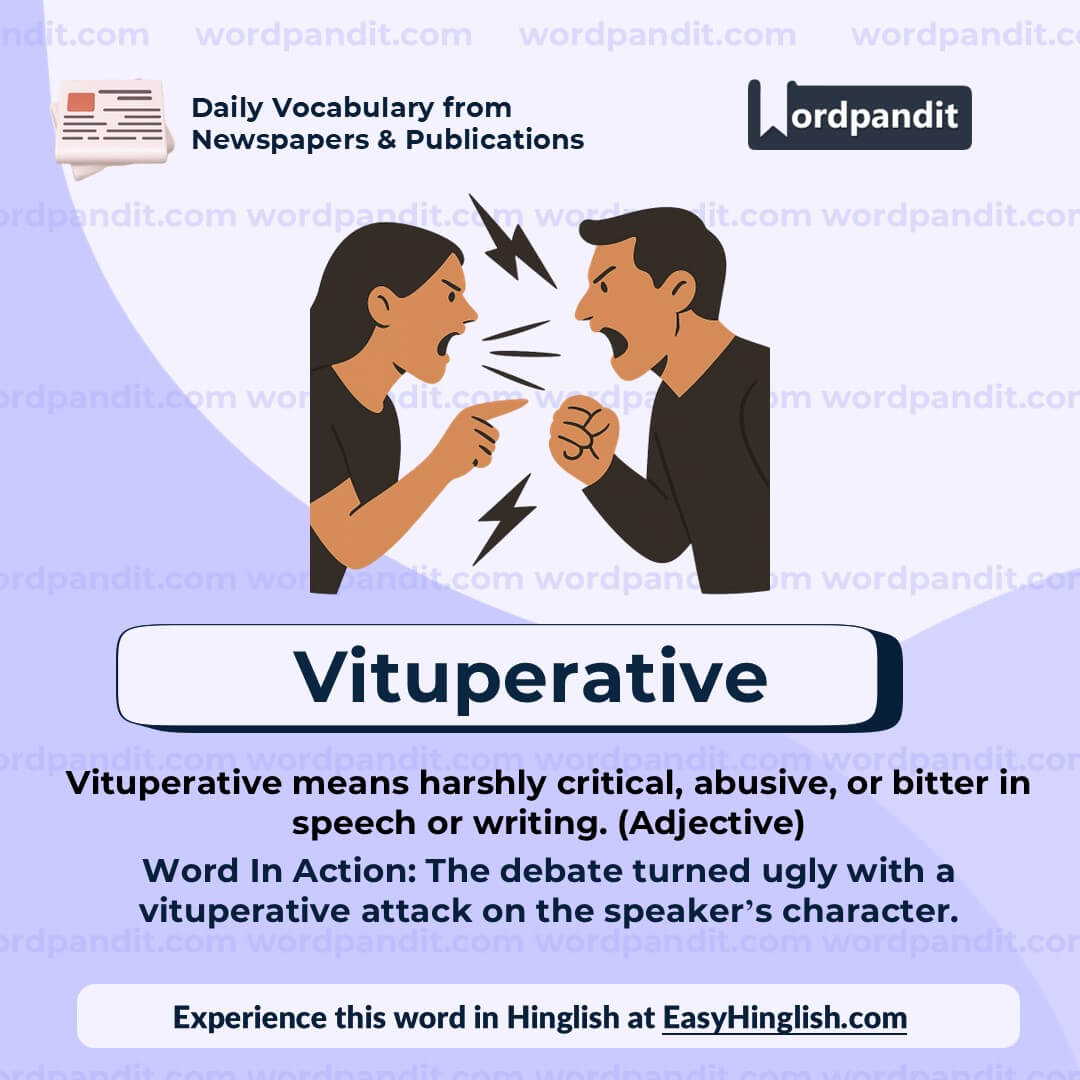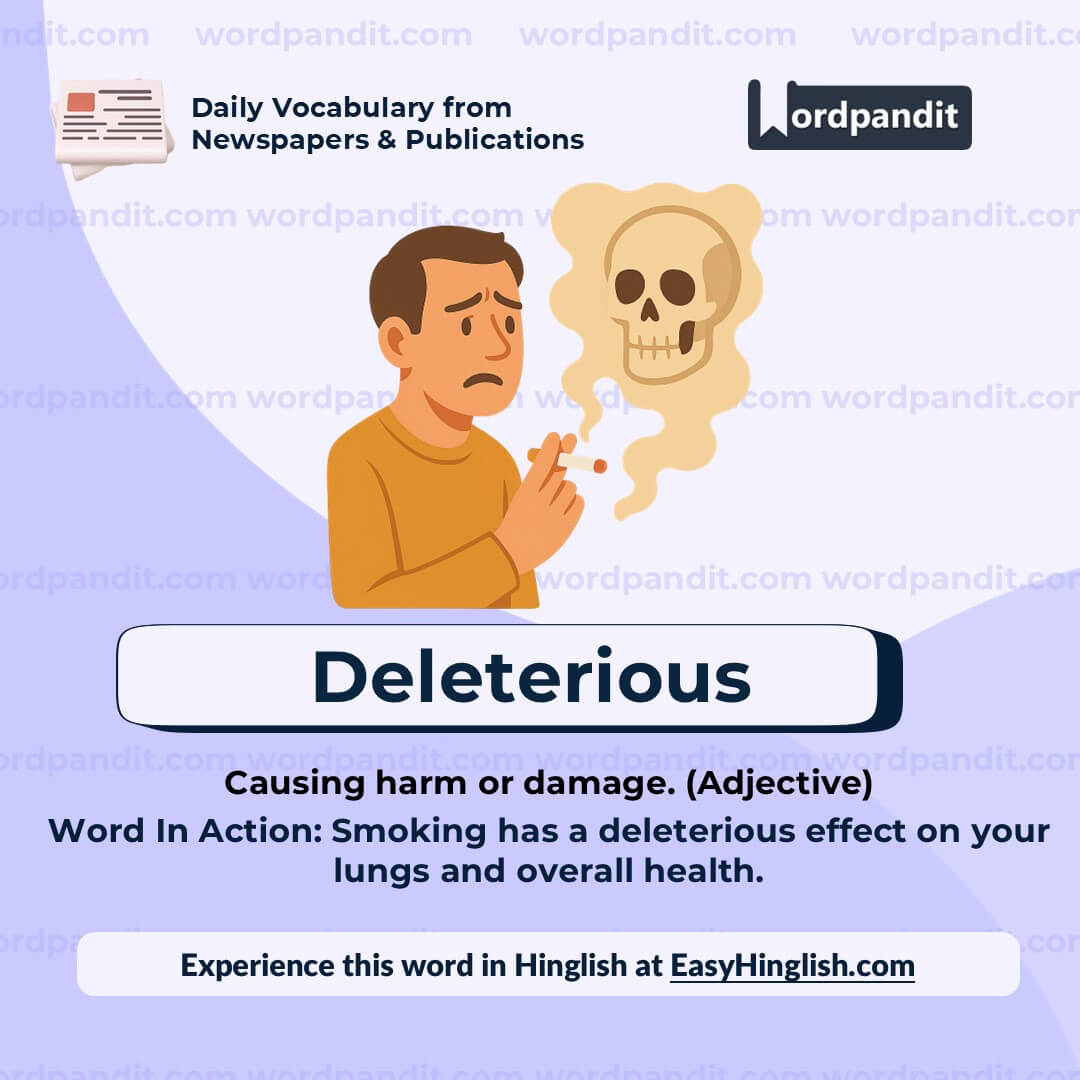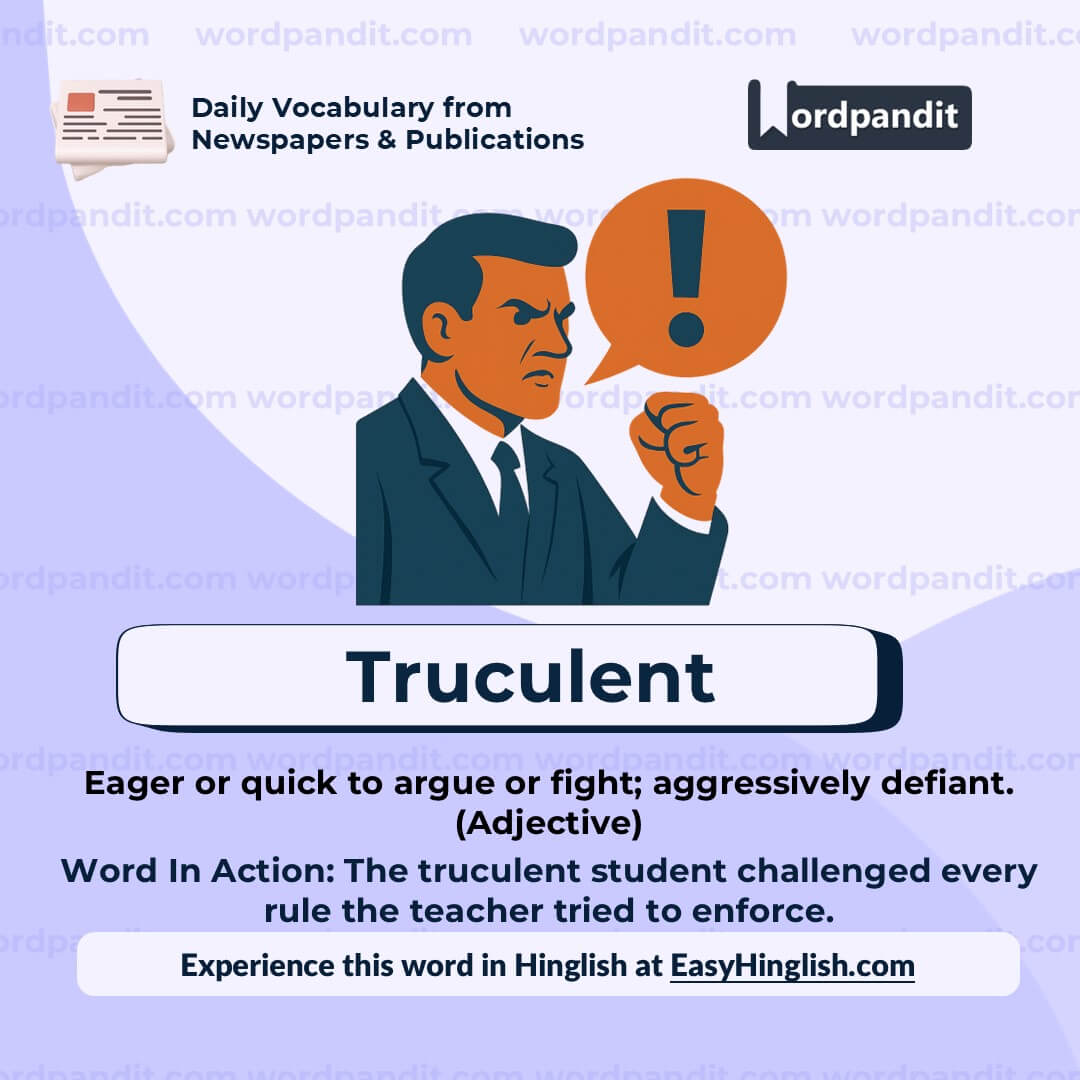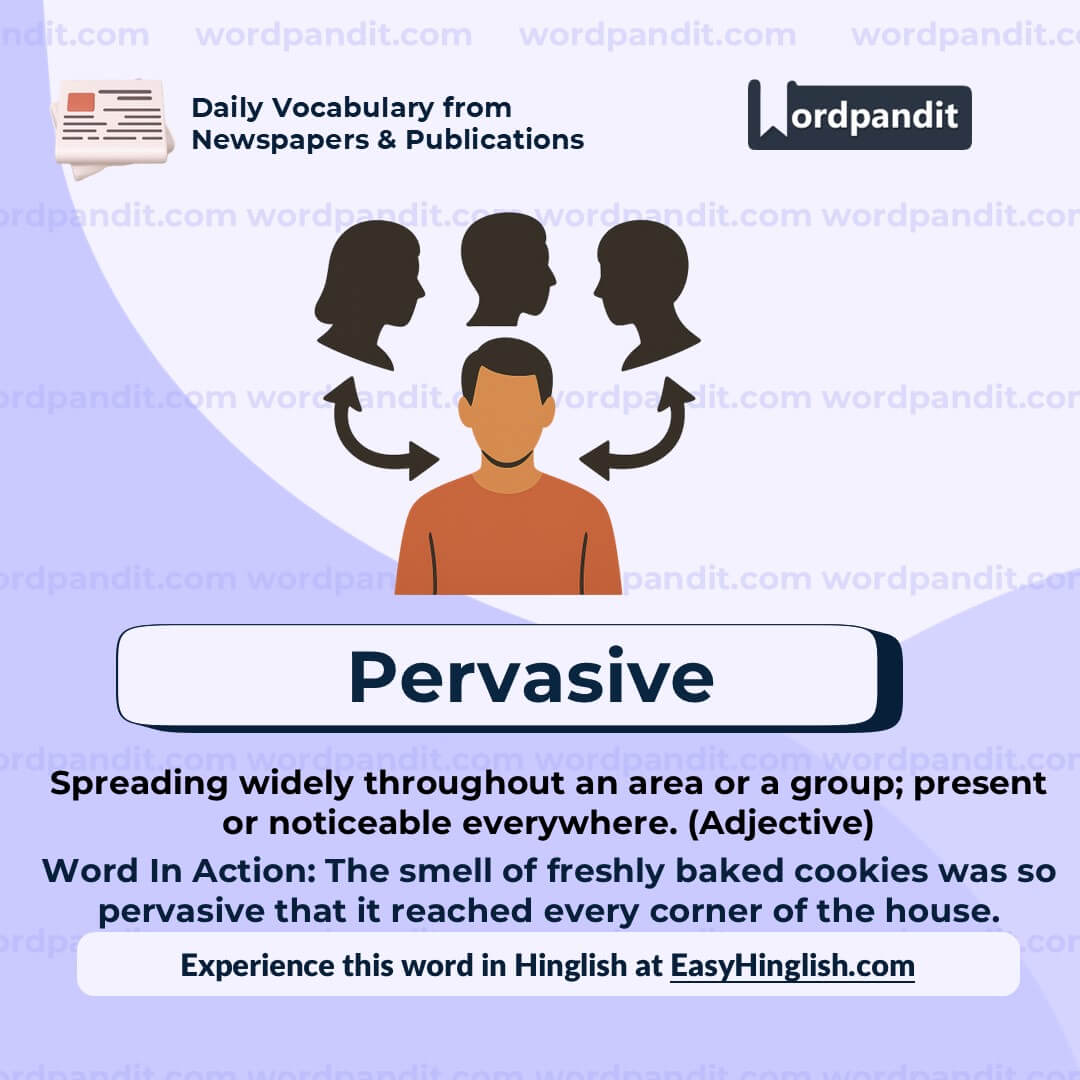Daily Vocabulary from International Newspapers and Publications
Expand Your Vocabulary with Wordpandit’s Global Vocabulary Hub
At Wordpandit, we are committed to helping you develop a truly global vocabulary by drawing from some of the most respected international publications. This section is designed to keep you ahead of the curve by introducing you to words that define global conversations and trends.
The Power of Global Sources
To help you think and communicate on a global scale, we curate vocabulary from renowned international sources, such as:
- The New York Times
- The Washington Post
- BBC
- The Guardian
- The Economist
- Scientific American
- Psychology Today
- And many more...
Stay Global, Stay Competitive
Our daily updates from international publications ensure you are consistently exposed to new words that reflect global news and developments, making sure your vocabulary is not only current but also globally relevant.
Enhance Your Global Perspective
Whether you’re preparing for international exams, aiming to excel in global business communication, or want to enhance your language skills for personal growth, Wordpandit offers the resources you need to thrive in a global context.
Effective Learning, Global Reach
Our learning methodology combines global examples, memory aids, and interactive activities, allowing you to internalize new words effectively and apply them in real-world scenarios.
Begin Your Global Vocabulary Journey Now!
Why Choose Wordpandit?
Practical Learning: Focus on words you'll actually encounter in real-world reading, enhancing your comprehension and communication skills.
Diverse Content: From current affairs to scientific breakthroughs, our varied sources expose you to vocabulary across multiple domains.
Effortless Integration: Make Wordpandit a part of your daily routine. Just a few minutes each day can significantly boost your lexicon over time.
Your Path to Vocabulary Mastery
- Visit our Daily Vocabulary section regularly
- Explore new words and their usage in context
- Practice incorporating these words into your own writing and speech
- Track your progress as your vocabulary expands
Start Your Journey Today
Embark on your vocabulary enhancement journey with Wordpandit. By consistently engaging with our daily posts, you'll build a robust vocabulary that serves you well in academic, professional, and personal contexts.
Remember, a word a day keeps linguistic limitations at bay. Make Wordpandit your daily companion in the quest for vocabulary excellence!
WORD-1: Inexorably
Context:
"Climate change is moving inexorably forward, altering ecosystems faster than many species can adapt." - Scientific American
Explanatory Paragraph:
The word "inexorably" describes something that is impossible to stop, slow down, or resist. It is often used in the context of events or forces that move forward with relentless certainty, regardless of any attempts to influence or halt them. When something happens inexorably, it is as though it has a destiny or inevitability about it—no matter what you do, it's going to keep happening.
Meaning: In a way that is impossible to stop or prevent (Adverb)
Pronunciation: in-EK-sur-uh-blee
Difficulty Level: ⭐⭐⭐⭐ Advanced
Etymology: From Latin "inexorabilis," meaning "not to be moved by entreaty," from "in-" (not) + "exorabilis" (able to be entreated).
Prashant Sir's Notes:
Think of "inexorably" as something that keeps going forward, like time or aging—no matter how hard we try, we can’t reverse or stop it. Use it when you want to show the unstoppable nature of a process or force.
Synonyms & Antonyms:
Synonyms: relentlessly, unavoidably, inevitably, unyieldingly
Antonyms: haltingly, avoidably, flexibly, preventably
Usage Examples:
- The tide crept inexorably inland, swallowing the shoreline piece by piece.
- Technology advances inexorably, leaving outdated systems in its wake.
- Despite protests, the project moved inexorably toward completion.
- She felt the years pass by inexorably, marked only by the birthdays of her children.
Cultural Reference:
"The machines rose inexorably, with no emotion, no mercy." — Inspired by the *Terminator* film series' depiction of unstoppable AI.
Think About It:
Can recognizing something as 'inexorable' help us make better choices about how we prepare for or adapt to it?
Quick Activity:
Write a short paragraph describing an event or trend you believe is happening inexorably in today's world. Use the word in your description.
Memory Tip:
Break it down as: "In (not) + ex (out) + orable (plead-able)" = Something that cannot be pleaded with or talked out of = unstoppable!
Real-World Application:
Use "inexorably" when writing about forces like time, progress, climate change, or aging—situations where change feels unstoppable. It's powerful in both scientific and philosophical discussions.
WORD-2: Vituperative
Context:
"The debate quickly turned vituperative, with both candidates abandoning policy discussions in favor of personal attacks." - BBC
Explanatory Paragraph:
When something is described as "vituperative," it means it is filled with harsh, angry, and abusive criticism. This word is often used to describe language, tone, or speech that is not just critical but downright venomous and hostile. A vituperative remark goes beyond disagreement—it’s meant to hurt or insult. It’s commonly seen in heated arguments, political debates, or angry rants.
Meaning: Bitter and abusive in language or tone (Adjective)
Pronunciation: vih-TOO-puh-ruh-tiv
Difficulty Level: ⭐⭐⭐⭐ Advanced
Etymology: From Latin "vituperare," meaning "to blame, scold, or censure," combining "vitium" (fault) and "parare" (to prepare or provide).
Prashant Sir's Notes:
Use "vituperative" when someone's language crosses the line from criticism into outright verbal abuse. It's not just disagreement—it's hostile, attacking, and often emotional.
Synonyms & Antonyms:
Synonyms: scathing, abusive, venomous, insulting, acrimonious
Antonyms: respectful, complimentary, courteous, civil
Usage Examples:
- The critic’s vituperative review crushed the young author’s confidence.
- Social media has become a breeding ground for vituperative comments during election season.
- His vituperative tone alienated even his closest allies.
- Instead of constructive feedback, the meeting turned into a vituperative exchange of accusations.
Cultural Reference:
“Vituperative rhetoric dominated the campaign trail, reminiscent of the combative debates seen during the 2020 U.S. presidential race.” – A reflection on political discourse.
Think About It:
How does vituperative language impact public dialogue and the ability to resolve conflicts peacefully?
Quick Activity:
Rewrite a vituperative sentence to make it firm but respectful. This helps you recognize tone and word choice in communication.
Memory Tip:
Think of “VITUPERATIVE” as someone spitting “VITriol” and “PERsonal” attacks—harsh and angry!
Real-World Application:
Understanding "vituperative" helps you identify toxic communication in politics, media, or interpersonal relationships—and reminds you when it’s time to step back from escalating negativity.
WORD-3: Deleterious
Context:
"Research suggests prolonged social media use can have deleterious effects on teenagers' mental health and self-image." - Psychology Today
Explanatory Paragraph:
"Deleterious" is a formal word used to describe something that causes harm or damage. It is often used in academic or scientific discussions when explaining the negative effects of a practice, trend, or substance. While it has a similar meaning to "harmful," "deleterious" is typically used in more serious or professional contexts, especially when the consequences are not immediately visible but still impactful over time.
Meaning: Causing harm or damage (Adjective)
Pronunciation: del-uh-TEER-ee-us
Difficulty Level: ⭐⭐⭐ Intermediate
Etymology: From Greek "dēlētērios" meaning "noxious" or "destructive," derived from "dēlēs" meaning "to harm."
Prashant Sir's Notes:
Think of "deleterious" as a slightly fancy or academic way to say something is harmful—especially in subtle, long-term, or hidden ways. Use it in essays or formal writing when "bad" or "harmful" feels too casual.
Synonyms & Antonyms:
Synonyms: harmful, damaging, injurious, detrimental, adverse
Antonyms: beneficial, helpful, advantageous, healthful
Usage Examples:
- Smoking has well-documented deleterious effects on cardiovascular health.
- Excessive screen time can be deleterious to children's eyesight.
- The policy changes, though well-intentioned, had deleterious consequences for small businesses.
- She avoided processed foods, believing them to be deleterious to her well-being.
Cultural Reference:
“The rise of algorithm-driven platforms has had a deleterious impact on political discourse.” – A common theme in modern media criticism and documentaries like *The Social Dilemma*.
Think About It:
Are the deleterious effects of modern technology outweighed by the benefits, or have we crossed a point where harm is now dominant?
Quick Activity:
List three things in your daily routine that could potentially have deleterious effects over time. How might you reduce their impact?
Memory Tip:
Think of “deleterious” like something you want to DELETE from your life because it’s harmful!
Real-World Application:
Use "deleterious" in formal writing—essays, reports, or research—to discuss risks, side effects, or harmful consequences of policies, habits, or technologies.
WORD-4: Truculent
Context:
"His truculent response to reasonable criticism has alienated many of his former supporters and colleagues." - Vox
Explanatory Paragraph:
"Truculent" describes someone who is aggressively defiant, quick to argue, or even ready to fight. A truculent person doesn’t just disagree—they push back with hostility, often coming off as combative or bad-tempered. The word often carries a sense of someone being ready for conflict, even when it’s unnecessary or unprovoked. It’s commonly used in political, social, or personal contexts where behavior turns confrontational.
Meaning: Aggressively defiant or hostile (Adjective)
Pronunciation: TRUHK-yuh-luhnt
Difficulty Level: ⭐⭐⭐⭐ Advanced
Etymology: From Latin *truculentus*, meaning "fierce" or "savage," derived from *trux* (wild, rough).
Prashant Sir's Notes:
Use "truculent" to describe someone who is not just argumentative but seems eager to lash out or pick a fight. It's stronger than "irritable" or "grumpy"—there’s an edge of danger or menace to it.
Synonyms & Antonyms:
Synonyms: hostile, belligerent, aggressive, defiant, combative
Antonyms: calm, gentle, peaceful, cooperative
Usage Examples:
- The coach’s truculent attitude made it difficult for the team to approach him with concerns.
- She responded truculently to even the most constructive feedback.
- The interview quickly became tense due to the candidate’s truculent tone.
- His truculence in meetings often derailed productive discussions.
Cultural Reference:
“The character of Tommy DeVito in *Goodfellas* is a classic example of truculence—ready to explode at the slightest provocation.” – Film Analysis
Think About It:
Is truculent behavior ever justified, or does it always hinder constructive communication?
Quick Activity:
Think of a recent public figure who displayed truculent behavior. Describe the situation in 2–3 lines using the word "truculent."
Memory Tip:
Remember: "Truculent" sounds like a mix of “truck” and “violent”—like a truck charging at someone. That’s how aggressive the word feels!
Real-World Application:
"Truculent" is useful in political analysis, workplace conflict descriptions, or character studies—anywhere a confrontational or hostile attitude needs to be sharply described.
WORD-5: Pervasive
Context:
"The report documents the pervasive influence of corporate lobbying on environmental legislation across multiple continents." - The Guardian
Explanatory Paragraph:
"Pervasive" describes something that spreads widely throughout an area, group, or system and is hard to ignore or escape. When something is pervasive, it’s present everywhere—it seeps into all corners, often unnoticed at first. This word is commonly used to describe ideas, behaviors, trends, or problems that are deeply embedded in society or systems, such as corruption, fear, or influence.
Meaning: Spreading widely throughout an area or group of people (Adjective)
Pronunciation: pur-VAY-siv
Difficulty Level: ⭐⭐⭐ Intermediate
Etymology: From Latin *pervasivus*, from *pervadere* meaning "to spread through," composed of *per-* (through) and *vadere* (to go).
Prashant Sir's Notes:
"Pervasive" is a great word to describe influence or presence that isn’t localized—it spreads across time, space, or people. It’s often used in writing on social, political, or environmental topics. Watch for overuse though—it’s powerful when used precisely.
Synonyms & Antonyms:
Synonyms: widespread, prevalent, omnipresent, extensive, all-encompassing
Antonyms: limited, rare, localized, confined
Usage Examples:
- Misinformation has become pervasive in online communities, making it harder to identify the truth.
- The artist's influence was pervasive, seen in the work of dozens of contemporaries.
- Fear was pervasive among the citizens during the long blackout.
- She noticed a pervasive sense of anxiety in the room before the exam began.
Cultural Reference:
"Surveillance is becoming increasingly pervasive in modern society" – a key theme in George Orwell’s *1984* and modern data privacy debates.
Think About It:
Can a positive mindset become as pervasive in a workplace as negativity often does? What would it take to make that shift?
Quick Activity:
Look around your environment (physical or digital) and note something that feels pervasive. Write one sentence describing it using the word "pervasive."
Memory Tip:
Think: "Per" (through) + "vase" (imagine a smell in a vase spreading out)—something that goes through and spreads everywhere = pervasive!
Real-World Application:
Use "pervasive" when writing essays, reports, or discussions on topics like technology, media, bias, or influence—anywhere a concept spreads widely and affects many aspects of life.



















